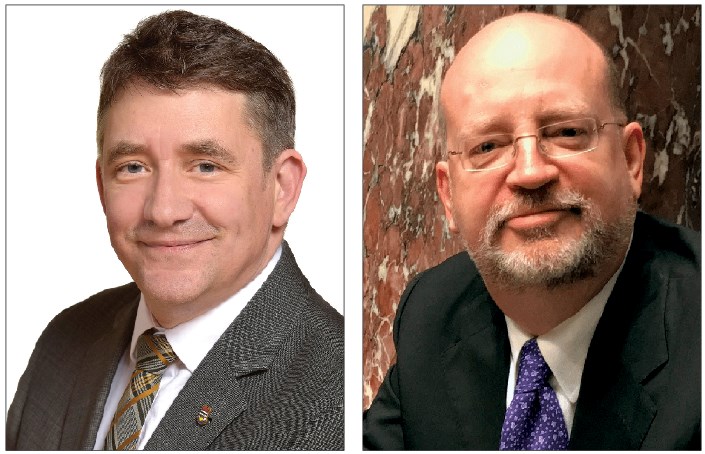The proportional representation (PR) referendum campaign started July 1, although those for and against changing the electoral system have been publicly arguing for their positions for several months now.
The start of the campaign period means rules on fundraising and spending have kicked in, and groups who want to be named as the lead Yes or No advocates and access $500,000 in provincial funding had until July 6 to get their applications into Elections BC.
The questions were reworded after input from the province’s chief electoral officer and British Columbians will now be asked: “Which system should British Columbia use for provincial elections: The current first-past-the-post voting system, or a proportional representation voting system?
“And, if British Columbia adopts a proportional representation voting system, which of the following voting systems do you prefer: Dual Member Proportional (DMP), Mixed Member Proportional (MMP), or Rural-Urban Proportional (RUP)?”
The NDP’s 2017 election platform committed an NDP government to holding a referendum and campaigning in favour of PR. Holding the vote this year was part of the agreement that ensured Green Party support for the NDP minority.
Powell River-Sunshine Coast MLA Nicholas Simons of the NDP said he supports his party’s position.
“I think proportional representation is a way to modernize our system and bring us into line with many other democracies,” Simons said. “Imagine yourself debating whether or not to implement the first-past-the-post system. I think that would be a very difficult sell to make, and here we have an option of opting for a system that makes every vote, essentially, count and I think that’s what people want in a democracy.”
Simons said he believes individual votes have more impact under PR because even if someone votes for a candidate or party that doesn’t get a seat in their riding, that vote will still go toward deciding the overall makeup of the legislature.
The No BC Proportional Representation Society is considered the most likely to get the Elections BC nod as the official No campaign.
Society president Bill Tieleman, a political strategist and consultant with close ties to the NDP, told Coast Reporter they favour the existing system because it’s “simple, successful and stable.”
“Proportional representation is confusing, it’s complicated. It creates situations where rural representation is reduced, that political parties’ power is increased, and that we have the possibility of extremist groups of the left, right, religious, etc., can be elected and hold the balance of power with five per cent of the vote.”
Tieleman also questions the idea that individual votes carry less weight in a first-past-the-post system.
“Our system is based on geography and accountable local representation,” he said. “I find it almost offensive when I hear proponents for proportional [representation] say my vote doesn’t count. My vote counted … but it doesn’t mean I win every vote, every time and it doesn’t mean if I live in a riding where most of my neighbours don’t agree with my perspective that I still get to have an elected representative in my riding.”
Simons and Tieleman also disagree on majority governments under first past the post.
Simons said when a majority government is elected there’s “no effort to compromise, no effort [to find] common ground or consensus building.”
But Tieleman said majorities offer a chance to move forward innovative policies, like the Agricultural Land Reserve (ALR). The ALR faced a lot of opposition when it was created by premier Dave Barrett’s NDP majority, but it’s now widely supported.
Simons points to the current government, an NDP minority supported by the Greens, as an example of how politics might work differently in a PR system.
“Governments have to take into consideration the views of other political perspectives when formulating policy – it’s great. We’re open to suggestions and ideas from anyone in the Legislature. That’s really how governments should be.”
Tieleman argues that the possibility of “perpetual minority governments” is one of the drawbacks of PR. “Minority governments tend to average 18 months to two years in Canada, so much shorter than the average term… You’ve got constant politicking going on and backroom deals.”
Simons said he has no preference among the three PR systems on the ballot, but he likes the idea that they include “made in B.C.” systems, and he’s confident voters are getting the information they need to make a decision.
Tieleman, though, said lack of information has been a major weakness of the referendum process.
“We have a situation where the government is proposing three different alternatives and two of them have never been tried anywhere in the world,” he said. “We don’t have riding boundary maps. Not one person in B.C. will be able to tell during this referendum what riding they would be in and how many MLAs would be in that riding and how the system they might choose will work in practice.”
Electoral reform was also an issue in the 2015 federal election, when the Liberals promised to make that election the last to be held under first past the post.
When asked for a statement on whether she planned to take a public position during the PR referendum, Liberal MP Pam Goldsmith-Jones told Coast Reporter, “We had significant engagement at three town halls in the summer of 2016. When the new [provincial] government indicated its interest in electoral reform, I wrote to Premier Horgan to provide our community’s valuable input.”
Elections BC said it expects to confirm which groups will be the fully funded Yes and No representatives by the middle of the month.
British Columbians will begin voting by mail on Oct. 22.
The full interviews with Simons and Tieleman can be heard in the new episode of Coast Reporter Radio, available July 6 at www.coastreporter.net/audio.



